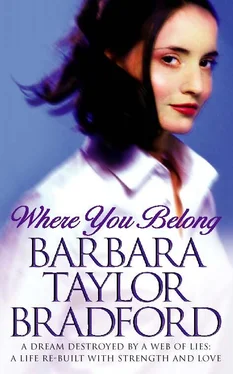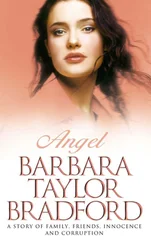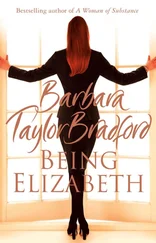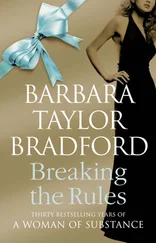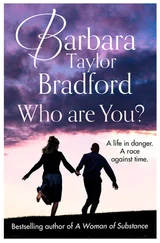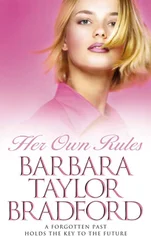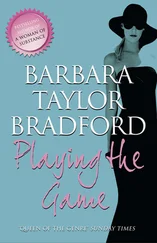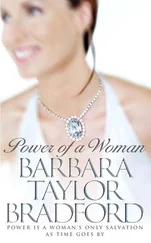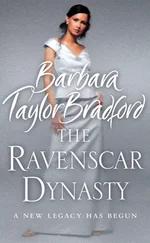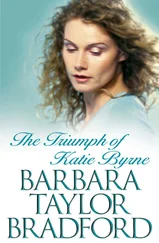Turning away from the front door, I spotted Jake coming towards me looking tanned and healthy and very smart in his dark suit, and wearing a shirt and tie for a change. But his expression was as sombre as his dark clothes, and he was limping as badly as he had yesterday when we’d arrived at Heathrow in a thunderstorm.
I didn’t dare mention the limp or ask him how he felt, since he’d practically bitten my head off last night when I’d worried out loud about his wounds. Instead I took hold of his arm, leaned into him and kissed his cheek.
He gave me a faint smile and said, ‘Sorry I kept you waiting. Now we’re running late, so we’d better get going, Val.’
I nodded and walked to the front door with him in silence, thinking how morose he was. He had sounded much more cheerful when we’d spoken earlier on the phone. But then he didn’t relish the next few hours any more than I did, I knew that.
The heavens opened up the moment Jake and I started to walk down the front steps of the hotel. The uniformed doorman hurried after us, wielding a large umbrella, and the two of us huddled under it as he led us to the waiting chauffeur-driven car which Jake had ordered last night.
Once we were seated in the car Jake said quietly, ‘It’ll be all right, Val, try not to worry so much. It’ll soon be over.’ Reaching out, he took hold of my hand and squeezed it reassuringly.
I glanced at him and gave him what must have been a rather sickly smile, and noticed the tight set of his lips, his drawn face. ‘You’re dreading the service just as much as I am. We’ve come to London against our better judgement. It’s a terrible mistake.’
‘We had no choice, we had to be here, so let’s just help each other through this as calmly as possible.’
‘Yes,’ I answered and turned my head, stared out of the car window, thinking what an awful, dreary day it was, especially for a memorial. Somehow the relentless rain, penetrating damp, and dark English skies emphasized the mournfulness of the occasion.
Being a very private person, especially when it came to my feelings, I’d never worn my emotions on my sleeve. And so I preferred to grieve for Tony in my own way, in the quiet of my home, not in a public place like the Brompton Oratory, although it was apparently a very beautiful Roman Catholic church; the Vatican of London, was the way someone had once described it to me years ago.
After a few minutes of staring out at the rain-sodden streets, as the car ploughed its way through the heavy London traffic, I turned away from the window. Taking a cue from Jake, who was huddled in the corner of the seat with his eyes closed, I did the same thing. And I did not open them until the car slid to a standstill outside the church.
I sat up, smoothed one hand over my hair, which I’d sleaked back into a neat chignon, and straightened the jacket of my black suit. Then I took a deep breath and made up my mind to get through the service with quiet dignity, and as much composure as I could muster.
There was such a crowd of people going into the Brompton Oratory it was hard to pick out friends and colleagues, or recognize anyone at a quick glance, for that matter. Everyone was dressed in black or other sombre colours, and faces were etched with solemnity or sorrow, or both.
I had wisely clamped on a pair of sunglasses before leaving the car, and these made me feel as if I were incognito, and also protected, if not actually invisible. Nevertheless, despite the concealing dark glasses, I clutched Jake’s arm as we mingled with the others filing into the church sedately and in a very orderly fashion.
We had just entered when I felt someone behind me tap me lightly on the shoulder. I glanced around to find myself staring into the lovely face of Nicky Wells, the Paris bureau chief of A.T.N., the most successful of all the American cable news networks.
She and I had been together in Tiananmen Square in Beijing, when the students had demonstrated against the Chinese government. That had been in 1989, and Nicky had been very helpful to me, since I was a beginner at the time. Fifteen years older than I, she had frequently taken me under her wing when I was such a novice.
We had remained friends ever since those early days, and would occasionally socialize in Paris. Standing next to Nicky was her husband Cleeland Donovan, another renowned war photographer, who had founded the agency Image some years ago. After the birth of their first child, Nicky had left the field as a war correspondent for her network, deeming it wiser and safer to remain in Paris covering local stories.
Jake and Clee had been good friends for many years, bonded as American expats, war photographers, and also as winners of the Robert Capa Award. This prize had been established in 1955, just after Capa’s death, by Life magazine and the Overseas Press Club of America, and was awarded for ‘the best photographic reporting from abroad requiring exceptional courage and enterprise’.
I knew that both men treasured this particular award as their proudest possession, Capa being a God to them, indeed to all of us in the business of being photojournalists covering wars.
The four of us hung back and spoke for a few moments about Tony and the sadness of the occasion, and then we arranged to make a date for dinner, once we were all in Paris at the same time for more than a couple of days.
As we began to move again it was Clee who said, ‘We can’t go to the wake afterwards, Jake. Nicky and I have to head back to Paris immediately after the service ends. Are you going?’ He looked from Jake to me.
I was so taken aback I couldn’t speak.
Jake cleared his throat, rather nervously I thought, and muttered something I didn’t quite catch. Then he added, ‘We’re in the same situation as you, Clee, we’ve got to get back too. Commitments to meet. But we might drop in for a few minutes, just to pay our respects.’
Nothing else was said, since the four of us were suddenly being edged forward by the throng pressing in behind us. I held onto Jake’s hand, but in the crush we became separated from Nicky and Clee. And a second or two later we found ourselves being ushered down one of the aisles and into a pew by a church official.
Once we were seated I grabbed Jake’s arm ferociously, pulled him closer to me and hissed, ‘You never told me anything about a wake.’
‘I thought it better not to, at least not until we got here,’ he admitted in a whisper.
‘Who’s giving the wake?’ I demanded, but kept my voice low, trying to curb my anger with him.
‘Rory and Moira.’ He glanced at me swiftly, and again nervously cleared his throat. ‘I have the distinct feeling we won’t be going, will we, Val?’
‘You bet we won’t,’ I snapped. I was livid.
It was just as well other people came into our pew at this precise moment, because it prevented a continuation of our conversation, which could have easily spiralled out of hand.
I was furious with Jake for not telling me about the wake before now, not to mention irritated with myself for not anticipating that there would be one.
Tony, after all, had been Irish; on the other hand, a wake was usually held after a funeral and not a memorial, wasn’t it? But the Irish were the Irish, with their own unique rules and rituals, and apparently a wake today was deemed in order, perhaps because the funeral had been held in Ireland. A wake was an opportunity for family and friends to get together, to comfort each other, to reminisce and remember, and to celebrate the one who had died. I was fully aware I wouldn’t be able to face the gathering. Coming on top of the memorial, it would be too much for me to handle. What I couldn’t understand was why Jake didn’t realize this.
Читать дальше
